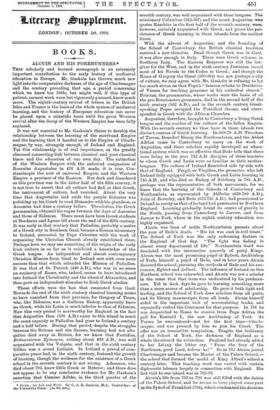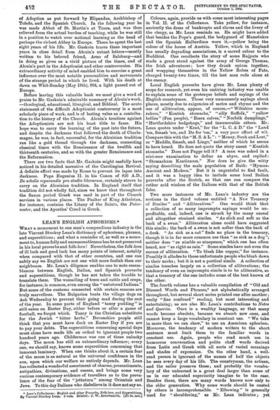THIS scholarly and learned monograph is an extremely important contribution
to the early history of ruediaeval education in Europe. Mr. Gaskoin has thrown much new light into the comparative darkness of the age of Charlemagne and the century preceding that age, a period concerning which we know too little, but might well, if this type of patient, earnest work were but vigorously pursued, know much more. The eighth-century revival of letters in the British Isles and France is the basis of the whole system of mediaeval learning, and the history of European education can never be placed upon a scientific basis until the great Western revival after the decay of the Western Empire has been fully explored.
It was not essential to Mr. Gaskoiu's theme to develop the relationship between the learning of the moribund Empire and the learning that it handed on to the Empire of (jharle- magne, by way, strangely enough, of Ireland and England. Yet this relationship is of real importance, as the greatly obscured connecting-link between classical and post-classical times and the education of our own day. The extinction of the Western Empire with the enforced resignation of Romulus Augustulus in 476 A.D. made, it is true, Con- stantinople the seat of universal Empire, and the Western Empire a province of the Eastern. But dark and disordered as this province was in the latter half of the fifth century, it is not true to assert that all culture had fled, or that Greek, the instrument of culture, had vanished. About the very time that Augustulus laid aside the purple Sidonius was polishing up his Greek to read Menander with his grandson, as Ausonius had done a century before. Theodosius, the Greek grammarian, obtained his vogue between the days of Ausonius and those of Sidonius. There must have been Greek students at Bordeaux and Lyons till about the end of the fifth century. It was early in that century that Palladins, probably a native of a Greek city in Southern Gaul, became a Roman missionary to Ireland, entrusted by Pope Celestine with the work of organising the Christian Church already established there. Perhaps here we may see something of the origin of the early Irish culture in so far as it exhibited a, knowledge of the Greek tongue. An independent and almost contemporary Christian Mission from Gaul to Ireland met with even more success than that which attended the Mission of Palladius. It was that of St. Patrick (44) A.D.), who was in no sense an emissary of Rome, who, indeed, seems to have introduced into Ireland the Christianity and the ritual of Alexandria, and thus gave an independent stimulus to Irish Greek studies.
Those efforts were the last that emanated from Gaul. Towards the end of the sixth century classical learning seems to have vanished from that province, for Gregory of Tours, who, like Sidonius, was a Gallican Bishop, apparently knew no Greek, while his Latin is much inferior to that of Sidonius. Now this very period is noteworthy for England in the fact that Augustine then (596 Al).) came to this island in much the same capacity as Palladius had gone to Ireland a century and a half before. During that period, despite the struggles between the Britons and the Saxons, learning had not alto- gether died away in Britain, for we know that Fastidius, Britanniarum Episcopus, writing about 430 A.D., was well acquainted with the Vulgate, and that in the sixth century Gildas was a sound Latinist. In Ireland a period of com- parative peace had, in the sixth century, fostered the growth of learning, though the evidence for the existence of a Greek school in the seventh century is not strong. Adamnan, who died about 704, knew little Greek or Hebrew; and there does not appear to be any conclusive evidence for Mr. Gaskoin's assertion that Cumine Ailbhe, in the third quarter of the • Alcuin: his Life attd Work. By C. J. B. Gaskoin, M.A. Cambridge ; at the University Press. [3s. 6d. net.]
seventh century, was well acquainted with these tongues. The missionary Columban (512-597) and the monk Augustine, who quotes Eusebius in the first half of the seventh century, were, however, certainly acquainted with Greek, and prove the per- sistence of Greek learning in these islands from the earliest times.
With the advent of Augustine, and the founding of the School of Canterbury, the British classical tradition received a new stimulus. Dead though Greek was in Gaul, it was alive enough in Italy. There were Greek colonies in Southern Italy. The Eastern Emperor was still the law- giver for the West, and in the sixth century Justinian issued most of his Novels to the Codes in Greek ; and though the Rome of Gregory the Great (590-604) was not perhaps a city of culture, we may agree with Mr. Gaskoin in refusing to lay too much stress on that Pope's "famous rebuke to Desiderius of Vienne for teaching grammar in his cathedral church." Priscian, the grammarian, whose works were the basis of all the pre-Renaissance grammars, died in the second half of the sixth century (562 A.D.), and in the seventh century Greek- speaking Popes occupied the Pontifical throne, and corre- sponded in Greek with the African Churches.
Augustine, therefore, brought to Canterbury a living Greek tongue and the residue of the culture of the fallen Empire. With the seventh century we thus have in these islands two distinct centres of Greek learning. In 669-70 A.D. Theodore of Tarsus, Benedict Biscop the Northumbrian, and the Abbot Adrian came to Canterbury to carry on the work of Augustine, and these scholars rapidly developed an educa- tional system which was so effective that Bede tells that there were living in the year 732 A.D. disciples of these teachers to whom Greek and Latin were as familiar as their mother- tongues. The culture of Ireland flourished side by side with that of England. Fergil, or Virgilius, the geometer, who left Ireland fully equipped with both Greek and Latin learning in 745 A.D., and who died as Bishop of Salzburg in 785 A.D., perhaps was the representative of both movements, for we know that the learning of the Schools of Canterbury and Northumbria, as represented by Aldhelm (639-709 Al).), John of Beverley, and Bede (673-735 A.D.), had penetrated to Ireland as surely as that of Ireland had penetrated to Northern England. Learning gradually found its centre of gravity in the North, passing from Canterbury to Jarrow, and from Jarrow to York, where in the eighth century education was highly organised.
Alcuin was born of noble Northumbrian parents about the year of Bede's death. "His lot was cast in evil times." The School of York was the only redeeming feature in the England of that day. "The light was fading in almost every department of life." Northumbria itself was desolated with the internecine quarrels of petty Kings. Alcuin was the most promising pupil of Egbert, Archbishop of York, himself a pupil of Bede, and in later years Alcuin directed the school, pursuing the methods of Bede and his suc- cessors, Egbert and Aelbert. The influence of Ireland on this Northern school was exhausted, and .Alcuin was not a scholar in the sense that that term was understood by his predeces- sors. Yet in dark days he gave to learning something more than a mere access of scholarship. He gave it both light and leading, and the School of York drew scholars from all parts, and its library manuscripts from all lands. Alcuin himself aided in the important task of accumulating books, and repeatedly visited the Continent for that purpose. In 781 he was despatched to Rome to receive from Pope Adrian the pall for Eanbald I., the new Archbishop of York. At Parma he encountered—not for the first time—Charle- magne, and was pressed by him to join his Court. The offer was an irresistible temptation. Despite the brilliancy of the School of York, the darkness of England as a whole threatened its extinction. England had already added to her Litany the bitter cry, "From the fury of the Northmen, good Lord, deliver us !" So in 782 Alcuin joined Charlemagne and became the Master of the Palace School,— the school that formed the model of King Alfred's school a century later. This teaching work was varied with certain diplomatic labours largely in connection with England. His last visit to our island was in 792-93.
Alcuin' i life from 793 to 796 was still filled with the duties of the Palace School, and he seems to have played some part in the Synod of Frankfort (794), which condemned the doctrine of Adoption as put forward by Elipandus, Archbishop of Toledo, and the Spanish Church. In the following year he was made Abbot of St. Martin's at Tours, and was thus relieved from the actual burden of teaching, while he was still in a position to watch over national learning as the head of perhaps the richest Abbey in Europe. There he spent the last eight years of his life. Mr. Gaskoin traces these important years in close detail from Alcuin's extant letters—mostly written to his beloved friend, Arno of Salzburg—and in doing so gives us a vivid picture of the times, and of Alcuin's part in the Adoptionist and other controversies. His extraordinary activity of mind enabled him to exercise a great influence over the most notable personalities and movements of the strange period in which he lived. With his death at dawn on Whit-Sunday (May 19th), 804, a light passed out of Europe.
Before leaving this valuable book we must give a word of praise to Mr. Gaskoin's admirable summary of Alcuin's work, —theological, educational, liturgical, and Biblical. The acute statement of the difficult Adoptionist controversy is a most scholarly piece of work, and is of lasting value as a contribu- tion to the history of the Church. Alcuin's treatises against the Adoptionists are not his least title to fame. His hope was to carry the learning of the past into the future, and despite the darkness that followed the death of Charle- magne, he was, in fact, successful, for the .Alcuinian tradition ran like a gold thread through the darkness, connecting classical times with the Renaissance of the twelfth and thirteenth centuries, and so with the greater Renaissance and the Reformation.
There are two facts that Mr. Gaskoin might usefully have noticed in his detailed narrative of the Carolingian Revival. A definite effort was made by Rome to prevent its lapse into darkness. Pope Eugenius II. in his Canon of 826 A.D., De scholis reparandis pro studio literarum, certainly strove to carry on the Alcuinian tradition. In England itself that tradition did not wholly fail, since we know that throughout the Saxon period Greek was used in part of the Church services in various places. The Psalter of King Athelstan, for instance, contains the Litany of the Saints, the Pater- noster, and the Apostles' Creed in Greek.























































 Previous page
Previous page